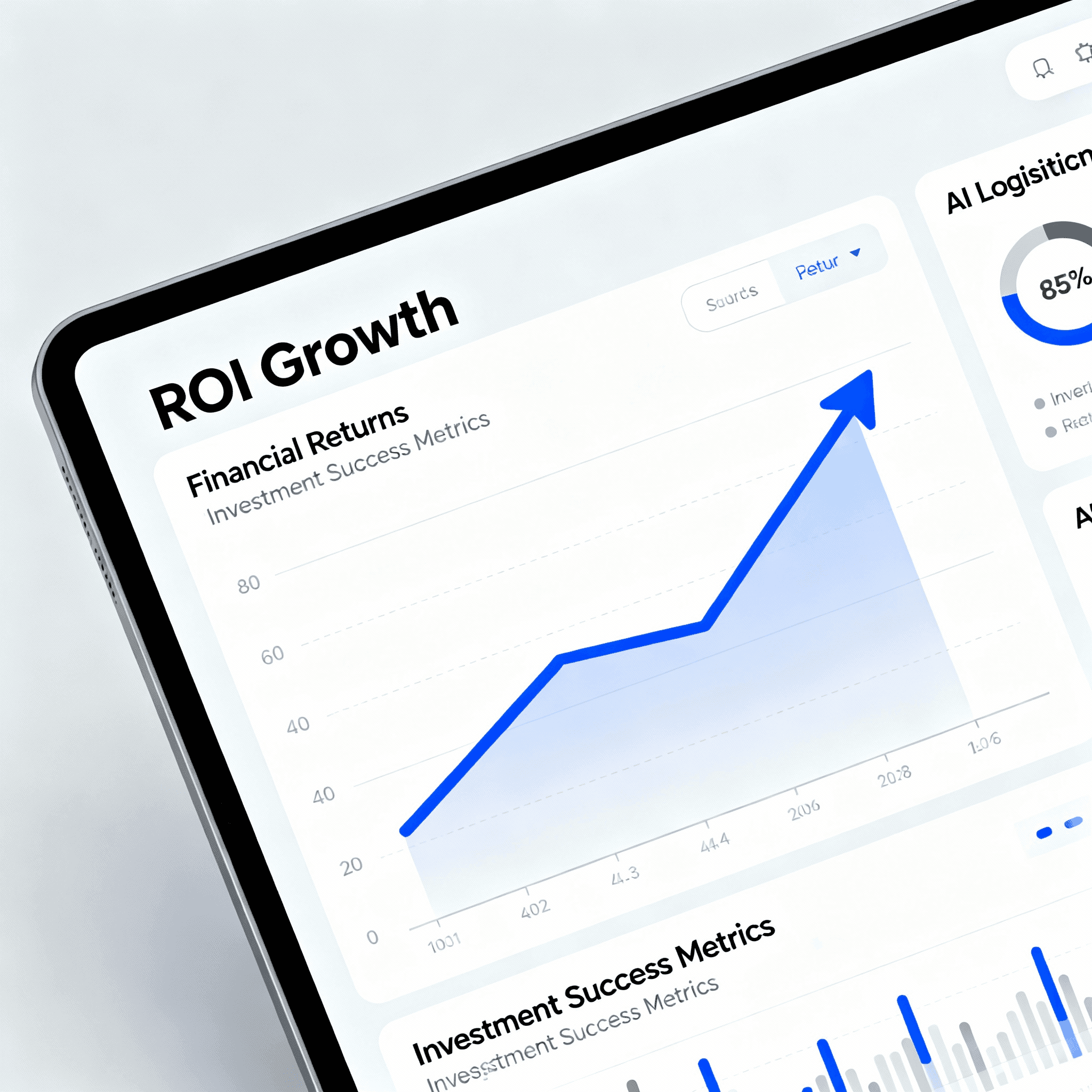What is the Typical ROI for AI Projects in Logistics?
Friday, 3 Oct 2025
|
What is the Typical Return on Investment (ROI) for an AI Project in Logistics?
In the fast-paced and ever-evolving logistics industry, AI is becoming a powerful catalyst for transformation. Whether you're overseeing operations as a CEO, C-suite executive, or COO, understanding the potential return on investment (ROI) from AI-powered projects can help you make informed decisions about tech adoption.
AI-driven logistics solutions are not just about enhancing operational efficiency but also unlocking substantial cost savings, increasing revenue, and improving customer satisfaction. But what does this really mean for your bottom line?
In this blog, we will explore how AI is changing the game for logistics companies and what a typical ROI from an AI project could look like.
The Benefits of AI in Logistics
The logistics industry has always been driven by efficiency, speed, and accuracy. AI’s role in the sector can be summed up as optimizing these critical factors. Some of the most notable benefits include:
Reduced Operational Costs
AI-powered automation and predictive analytics can significantly reduce costs associated with manual labor, delays, errors, and inefficiencies. From streamlining warehouse management to optimizing delivery routes, AI reduces time, resources, and human error.
Enhanced Decision-Making
By utilizing vast amounts of data, AI can help logistics leaders make informed decisions that directly impact profitability. Predictive maintenance tools help fleet managers avoid breakdowns, while AI-driven insights into supply chain performance help businesses stay agile and reduce operational bottlenecks.
Improved Customer Experience
Logistics companies can offer faster, more reliable services. AI-powered chatbots and predictive analytics provide real-time updates to customers, reducing the need for manual customer service intervention and enhancing overall satisfaction.
Supply Chain Visibility
AI tools such as digital twins and automated real-time tracking provide logistics managers with full visibility into their supply chains. This visibility ensures faster response times and proactive decision-making that further reduces costs and increases efficiency.
Real-World Examples of AI ROI in Logistics
Several major logistics companies have already reaped the benefits of AI. Let’s look at some real-world examples:
- AI-Driven Route Optimization:
Companies like Maersk and DHL have integrated AI into their fleet management systems to optimize delivery routes. The result? Reduced fuel consumption, lower operational costs, and faster delivery times. Some businesses report a 10-20% reduction in delivery costs after implementing AI-based solutions. - Warehouse Automation:
Amazon has invested heavily in AI-powered robots and warehouse management systems, improving stock accuracy, reducing human labor costs, and speeding up fulfillment times. AI-driven systems in Amazon's fulfillment centers have resulted in a 30% improvement in operational efficiency, with the promise of faster turnaround times and reduced overheads. - Freight Pricing Optimization:
AI models are now used to dynamically adjust freight pricing based on variables such as demand, supply chain disruptions, and competitor pricing. This ensures competitive yet profitable pricing models for logistics companies.
How to Calculate AI ROI for Your Logistics Company
The ROI of AI projects can vary widely based on the scale of the project, the technology used, and the specifics of your logistics operations. However, there are general metrics you can use to estimate ROI:
- Cost Reduction:
Calculate the savings made through automation and AI-driven decisions. Look at costs like manual labor, fuel consumption, and system inefficiencies, and measure the reduction in these areas after implementing AI. - Revenue Growth:
AI can open doors to new revenue streams. Whether through improved customer experience, faster delivery, or new service offerings, the added value from AI is often reflected in improved customer retention and higher order volumes. - Productivity Gains:
With AI-powered systems, employees can focus on higher-value tasks while the system handles repetitive work. This productivity increase can be measured by comparing output before and after AI adoption.
The Path Forward: How to Get Started with AI in Logistics
Before diving headfirst into AI adoption, it’s crucial to understand the specific challenges and opportunities unique to your business. Ask yourself:
- What areas of my logistics operations can be improved with automation?
- How can predictive analytics improve decision-making and reduce waste?
- What is the potential for improving customer service with AI tools like chatbots or real-time tracking?
AI adoption is not just about technology—it’s about transforming the way you do business. With the right approach, logistics companies can realize a significant ROI while future-proofing their operations.
Ready to Transform Your Logistics Operations with AI?
AI-powered logistics solutions are the future, and now is the time to capitalize on them. Want to explore how Debales AI can drive ROI for your logistics operations?
Book a demo and see firsthand how our solutions can enhance efficiency, reduce costs, and elevate customer experiences.
For more insights on how AI is revolutionizing logistics, check out our previously published blogs like What is a Digital Twin and How is it Used in Logistics AI? and How Predictive Analytics Works for Logistics, Driving Smarter Supply Chains.
All blog posts
View All →
Saturday, 21 Feb 2026
Why detention keeps hitting your P&L (and how to stop it)
Detention and accessorials keep spiking because appointments, docs, and visibility break down. Here’s a practical playbook to cut fees this month.

Saturday, 21 Feb 2026
Stop Paying Detention: Fix Your Yard-to-Dock Handoff
Detention and accessorials keep rising because dock schedules and real-time arrival data don’t match. Here’s how ops teams can fix it fast.

Saturday, 21 Feb 2026
Why your freight data is lying to you (and costs)
Freight data gaps drive detention, billing disputes, and missed ETAs. Learn why it keeps happening and what to fix this week across TMS, WMS, and carriers.